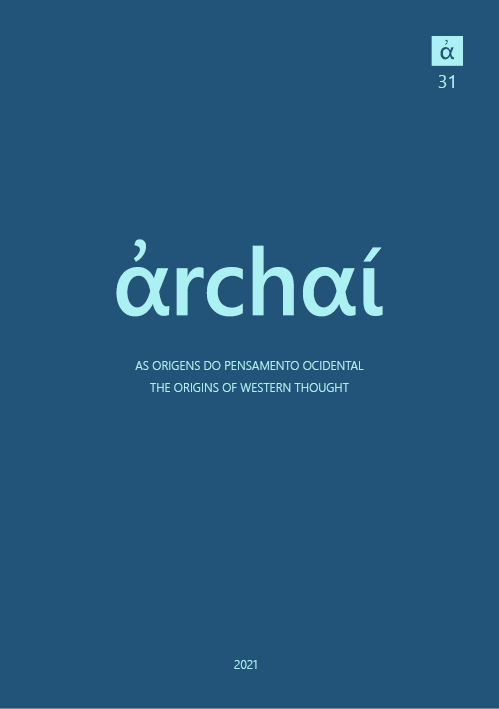Gorgias' Revising of Ancient Epistemology: on Non-Being by Gorgias and its Paraphrases
DOI:
https://doi.org/10.14195/1984-249X_31_27Palavras-chave:
Gorgias, Parmenides, argumentation, argumentative structure, ancient epistemologyResumo
The philosophical nature of the two versions of paraphrasing the Gorgias’ treatise On Non-Being — the skeptical version by Sextus Empiricus and the peripatetic version by an anonymous author — are discussed. The paper gives a comparative analysis of the arguments upheld by the informants enunciating Gorgias’ thoughts, demonstrates the range of philosophical problems, which Gorgias considered, judging by the reports of his speech, and shows how both versions add to and clarify each other in terms of philosophical issues. The work provides insights as to how Gorgias modernizes and transforms the initial attitudes of Parmenides, shifting the reasoning plan: from how thought can be directed to an object and the qualities of this object to how thought can be directed to the non-existent. Accordingly, the problems of intentionality in the Gorgias’ teaching are considered as well as the privileged status of any of mental states, the nature of word or speech as an autonomous way to develop knowledge about external objects, the issue of meaning as a reference, and inter-subjectivity in cognition. A conclusion is reached that giving preference to one of the paraphrasing versions impoverishes our understanding of the Gorgias’ teaching considerably, while the joint analysis of both versions demonstrates the engagement of the sophistic issues raised by Gorgias, in the philosophical and, particularly, the epistemological paradigm of the ancient as well as modern philosophy.Downloads
Referências
CASTON, V. (1998). Aristotle and the Problem of Intentionality. Philosophy and Phenomenological Research, n. 58, p. 249–298.
CASTON, V. (2002) Gorgias on Thought and Its Objects. In: CASTON, V.; GRAHAM, D. W. Presocratic Philosophy: Essays in honour of Alexander Mourelatos. Hampshire, Aldershot, p. 205–232.
CURD, P. (2004). The Legacy of Parmenides. Eleatic Monism and Later Presocratic Thought. Las Vegas, Parmenides Publishing.
KERFERD, G. B. (1955). Gorgias on Nature or That Which Is Not. Phronesis 1, n. 1, p. 3–25.
MOURELATOS, A. P. D. (1987). Gorgias on the Function of Language. Philosophical Topics XV, n. 2, p. 135–170.
MOURELATOS, A. P. D. (2008). The route of Parmenides: revised and expanded edition; with a new introduction, three supplemental essays, and an essay by Gregory Vlastos. Las Vegas, Parmenides Publishing.
OWEN, GEL (1960). Eleatic Question. Classical Quarterly, n. 10, p. 84–102.
PERLER, D. (2002). Theorien der Intentionalität im Mittelalter. Frankfurt am Main.
SCOLNICOV, S. (2003). Plato's Parmenides. Translated with introduction and commentary. Berkeley/Los Angeles/London, University of California Press.
STRIKER, G. (1996). Methods of sophistry. in: Striker, G. Essays on Hellenistic Epistemology and Ethics. Cambridge, Cambridge University Press, p. 3–21.
Downloads
Publicado
Como Citar
Edição
Seção
Licença
Copyright (c) 2021 Marina Volf

Este trabalho está licenciado sob uma licença Creative Commons Attribution 4.0 International License.
Dado o acesso público desta revista, os textos são de uso gratuito, com obrigatoriedade de reconhecimento da autoria original e da publicação inicial nesta revista. O conteúdo das publicações é de total e exclusiva responsabilidade dos autores.
1. Os autores autorizam a publicação do artigo na revista.
2. Os autores garantem que a contribuição é original, responsabilizando-se inteiramente por seu conteúdo em caso de eventual impugnação por parte de terceiros.
3. Os autores garantem que a contribuição que não está em processo de avaliação em outras revistas.
4. Os autores mantêm os direitos autorais e concedem à revista o direito de primeira publicação, sendo o trabalho licenciado sob a Creative Commons Attribution License-BY.
5. Os autores têm permissão e são estimulados a publicar e distribuir seu trabalho on-line após a publicação na revista.
6. Os autores dos trabalhos aprovados autorizam a revista a, após a publicação, ceder seu conteúdo para reprodução em indexadores de conteúdo, bibliotecas virtuais e similares.
7. É reservado aos editores o direito de proceder ajustes textuais e de adequação do artigo às normas da publicação.



